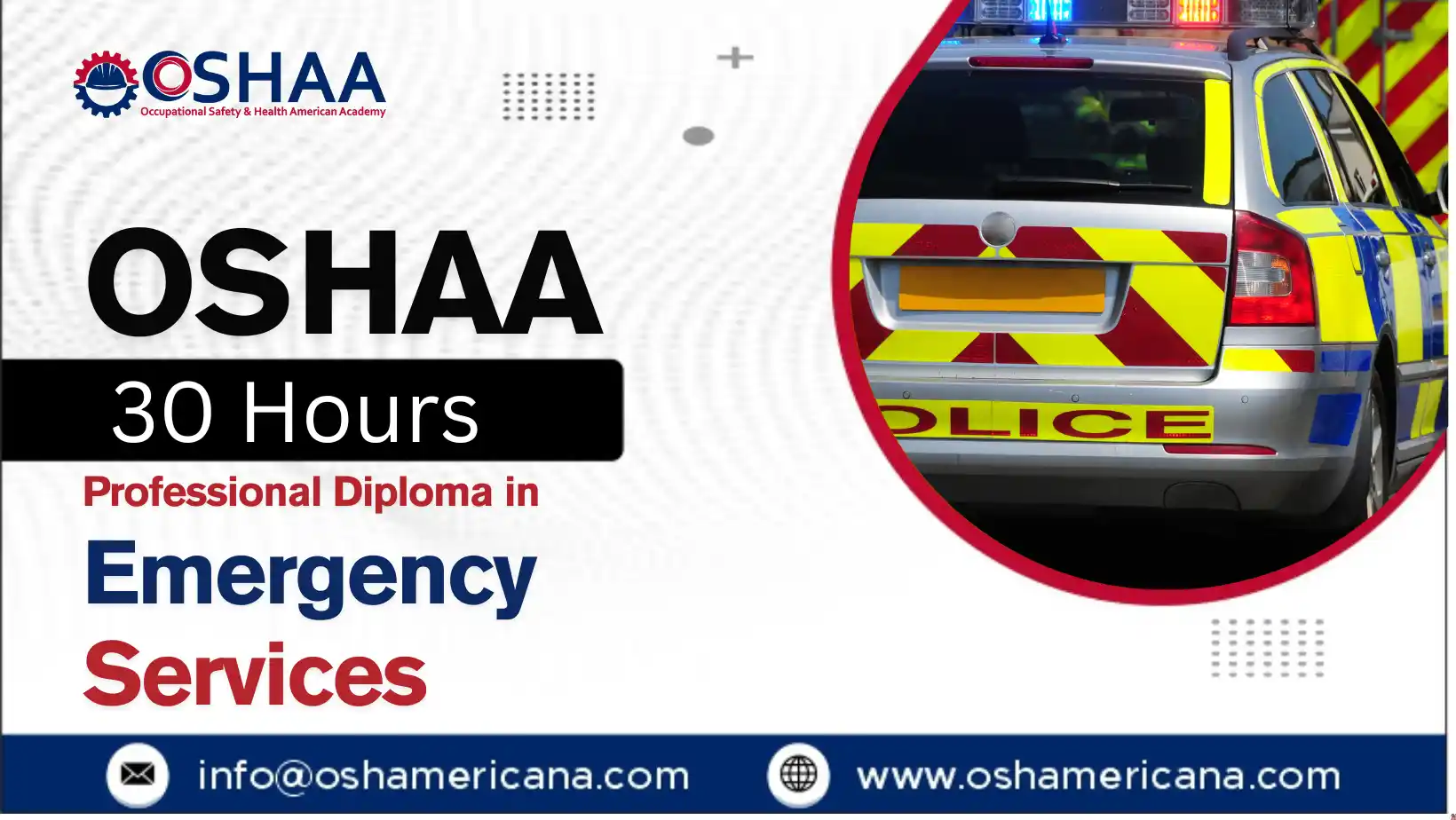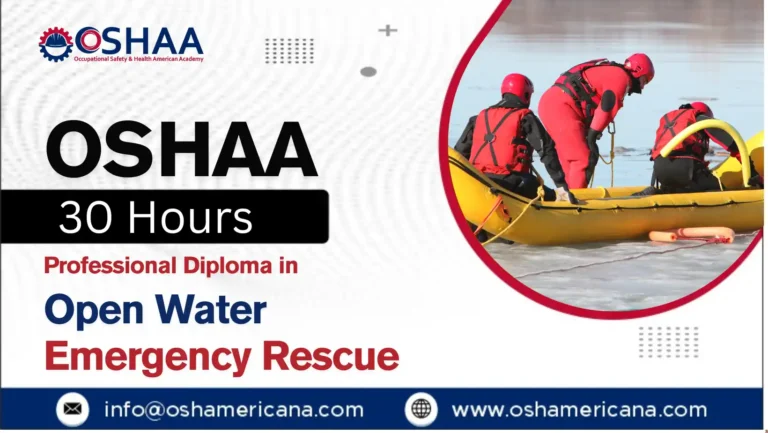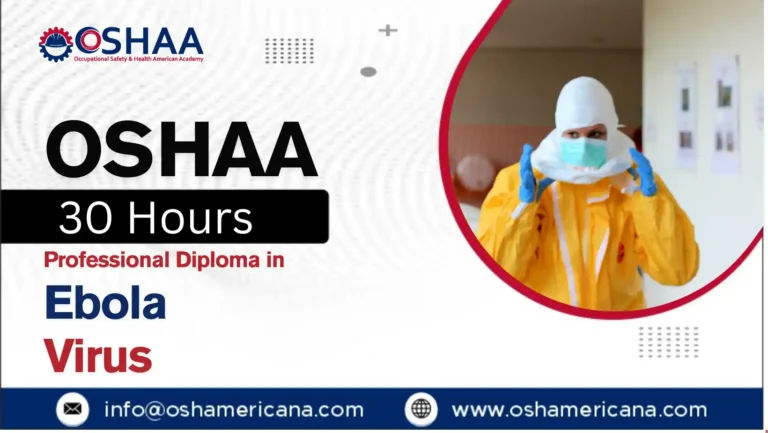The OSHAA 30-Hours Professional Diploma in Emergency Services is a dynamic and comprehensive programme designed to equip participants with essential knowledge and practical skills required for effective response in emergency and crisis situations. Whether responding to medical incidents, natural disasters, fire hazards, or public safety threats, the course offers a solid foundation in emergency protocols and decision-making under pressure.
The diploma provides an in-depth exploration of the structure and responsibilities of emergency services, including fire and rescue, medical response, police operations, and disaster coordination. It places strong emphasis on communication, critical thinking, situational awareness, and teamwork – all essential competencies for managing high-risk scenarios.
This diploma is ideal for participants seeking to pursue roles in emergency services, public safety, or community response initiatives. It is particularly relevant for those aspiring to join fire and rescue teams, paramedic services, law enforcement, or civil defence. It also supports individuals in non-governmental and volunteer organisations who assist during emergencies or disasters.
After completing the diploma, participants can explore progression opportunities in emergency management, occupational health and safety, crisis leadership, or emergency medical care. The course also provides a strong foundation for future study in disaster science or risk planning.
The OSHAA 30-Hours Professional Diploma in Emergency Services empowers participants with critical knowledge and readiness to act effectively during emergencies. With a balance of theory and practical application, it prepares individuals to serve communities with competence, courage, and commitment in times of urgent need.
OSHAA 30-Hours Professional Diploma in Emergency Services
Study Units
Learning Outcomes
Introduction to Emergency Services and Their Roles (3 hours)
- Understand the structure and functions of key emergency services
- Identify the roles and responsibilities of personnel in various emergency sectors
- Recognise how services collaborate during multi-agency incidents
- Develop awareness of the importance of emergency preparedness in communities
Principles of Incident Management and Risk Assessment (3 hours)
- Understand the stages of incident management and response protocols
- Conduct basic risk assessments in emergency scenarios
- Apply the principles of hazard identification and control
- Learn how to prioritise actions and allocate resources effectively during emergencies
Emergency First Aid and Basic Life Support (4 hours)
- Perform essential first aid techniques including CPR and wound care
- Recognise and respond to life-threatening conditions such as cardiac arrest and choking
- Apply safe handling and patient assessment practices
- Understand the role of first aid in stabilising casualties until professional help arrives
Fire Safety Procedures and Evacuation Protocols (5 hours)
- Identify common fire hazards and preventative measures
- Understand fire classifications and appropriate extinguishing methods
- Learn procedures for safe evacuation and emergency planning
- Apply knowledge of fire safety equipment and building regulations
Communication and Coordination During Emergencies (6 hours)
- Develop effective verbal and non-verbal communication skills under pressure
- Understand the importance of clarity and calmness in high-stress situations
- Coordinate with emergency teams and the public during incident response
- Apply strategies for delivering accurate information and instructions
Disaster Response and Recovery Planning (4 hours)
- Understand the phases of disaster management: preparedness, response, recovery
- Learn how to support communities during and after disasters
- Develop knowledge of resource mobilisation and logistical support
- Apply recovery strategies that support resilience and continuity
Personal Safety and Protective Equipment in Emergency Situations (2 hours)
- Identify different types of personal protective equipment (PPE) and their correct usage
- Understand safety protocols to minimise personal risk
- Apply hygiene and biohazard precautions during emergency response
- Recognise the importance of self-care and physical readiness in emergency work
Mental Health Awareness in Crisis Response (3 hours)
- Recognise signs of stress, trauma, and burnout in emergency personnel
- Understand the psychological impact of critical incidents on responders and victims
- Apply basic strategies to manage mental health during and after emergencies
- Promote supportive environments and peer wellbeing within emergency services
Course Benefits: OSHAA 30-Hours Professional Diploma in Emergency Services
- Provides a comprehensive understanding of the roles and responsibilities within emergency services
- Equips participants with essential life-saving skills including first aid and basic life support
- Enhances ability to assess risks, manage incidents, and respond effectively to emergencies
- Strengthens communication and coordination skills vital for high-pressure situations
- Offers practical knowledge in fire safety, evacuation, and disaster recovery planning
- Increases awareness of mental health challenges in crisis response and promotes emotional resilience
- Supports personal safety through proper use of protective equipment and safety protocols
- Prepares participants for roles in public service, volunteer emergency work, or community safety initiatives
- Encourages responsible, ethical conduct in emergency situations
- Serves as a valuable foundation for further training in emergency management, paramedicine, or safety leadership
The OSHAA 30-Hours Professional Diploma in Emergency Services is designed for participants who are interested in building the knowledge and skills necessary to respond effectively in emergency and crisis situations. This course is particularly suited for:
- Individuals aspiring to pursue careers in fire and rescue, paramedical services, or public safety
- Volunteers and community members involved in disaster preparedness or emergency support roles
- Staff in educational, corporate, or public environments responsible for health and safety
- Professionals seeking to enhance their understanding of emergency procedures and risk management
- Anyone aiming to develop practical competencies in first aid, crisis response, and incident coordination
This diploma supports participants with or without prior experience, offering essential training for those committed to improving community safety and emergency readiness.







